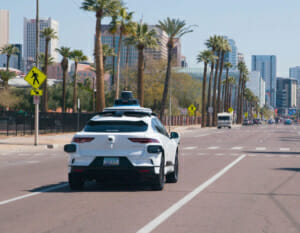Debbie Johnson thought she was just coming for a race at Phoenix International Raceway when she visited Arizona in April of 1986.
“I was living in Wyoming at the time,” recalls the president and CEO of the Arizona Lodging & Tourism Association (AzLTA). “We flew back into Denver to drive up to Wyoming and got stuck because it was snowing so hard the roads were closed. I decided right then and there that I was moving and moved to Arizona the following year.”
Now, as leader of the leading public policy advocate for Arizona’s lodging and tourism industry, Johnson hopes to keep other visitors coming back to the Grand Canyon state.
Az Business talked tourism with the woman who played a key role in the state’s ability to land hosting duties for this year’s Super Bowl, the 2016 College Football Championship Game and the 2017 Final Four.
Az Business: Why did the AzLTA decide to get political in 2014?
Debbie Johnson: We have been involved in previous elections, but on a much smaller scale. I think we’ve seen over the past several years the importance of getting involved and, obviously, this was a big election. With the direction of our board, we looked at it and said, “This is a time we need to get involved,” and that’s what we did.
AB: How did AzLTA’s political role look?
DJ: We looked for candidates who were supportive of tourism. We looked at issues. While we didn’t endorse candidates, we did do (political action committee) PAC dollars and we donated $12,000 in PAC funds. We designated tourism champions instead of endorsements and made sure our industry knew who was supportive of tourism. We decided that it was worth the risk you take sometimes when you get involved in elections.
AB: Why was getting political in November more important than in previous elections?
DJ: We have seen some issues come up over the past few years and realized that we had not done as good a job as we could educating elected officials about the value of tourism. That was on us, so we really wanted to take that role and educate those people who are going to be the leaders of our state about the value and importance of tourism so they have a better understanding. I think we also educated our members so they understand that elected officials have hundreds of issues on their desks every year. For us it’s intuitive, but they don’t work in tourism, so it’s our job to make sure they are informed. The quality of life here is great because of the tourism industry, even from a residential standpoint. Letting elected officials know about the dollars the tourism industry brings, the jobs that it brings and the economic impact is important.
AB: How did you balance getting more political without burning any bridges?
DJ: We were careful. We met with virtually every candidate and got their thoughts and opinions on tourism. From our standpoint, we felt like we had done everything we could to educate them and it was worth the time, effort and the responsibility from the PAC funds to make sure we were recommending the right people as tourism champions and PAC dollar recipients.
AB: How did the elections go for the tourism industry?
DJ: All in all, we were pretty happy. There are always some unknowns, but we feel there is strong leadership in the governor’s office. We’ve got some legislators who understand our industry and will be there when we need them to listen. It’s all about building relationships and about us understanding them and them understanding us. Hopefully, when a tourism issue crosses their desks now, they will reach out because they’ve met us and heard of us and that’s something that we didn’t have before.
AB: What do political leaders need to know about how their actions impact your industry?
DJ: They need to realize that tourism impacts all business. We have a $2.9 billion tax revenue impact. That’s a lot of money. So the decisions they make not only affect the tourism industry, but ancillary businesses like home builders, realtors, car sales and other services.
AB: In the next three years, Arizona will host the three biggest events in sports. What is Arizona doing right to keep landing these mega events?
DJ: The organizations that schedule these events look at Phoenix as a great model. Phoenix is only the second city in history to host these three mega events back to back to back. The other city was New Orleans. It goes to show the collaboration we have as a tourism community, but as a business community and with the cities.
AB: What is the winning formula you’re using in pitch meetings?
DJ: One of the sales pitches we used for the Final Four was saying, “Look at all these events that we’ve successfully hosted. We deserve a chance to host a Final Four and we’re going to show you how to do it.” They really took to that. They looked at the things we did right with past events. When they were here for the Final Four site visit, there was not one thing the tourism community, business community, stadium could have done better. We rolled out the red carpet and showed them our hospitality, our leadership, our collaborative efforts and they were really impressed. It’s all the cities coming together to show the benefit of hosting events in Arizona. They want the fans and the athletes to have good experience and we give them a great experience. We have such a diverse offering in terms of activities and amenities and things to do — spring training, golf, Sedona, a trip to the Grand Canyon, we’ve now become a food and wine destination. We’ve proven that they’re going to have fun here.
AB: How do these mega event impact economic development?
DJ: Their first step in getting a business to move here is getting their leadership to visit here. Any time we can talk about Arizona as a place to visit and as a place to do business, that media perception of Arizona as a positive, wonderful place to work and live and visit is tremendous. The economic development groups know that the business leaders need to come here first to see what we have to offer. If we put on the best face we can, people want to come back not just to visit, but to live and work.




